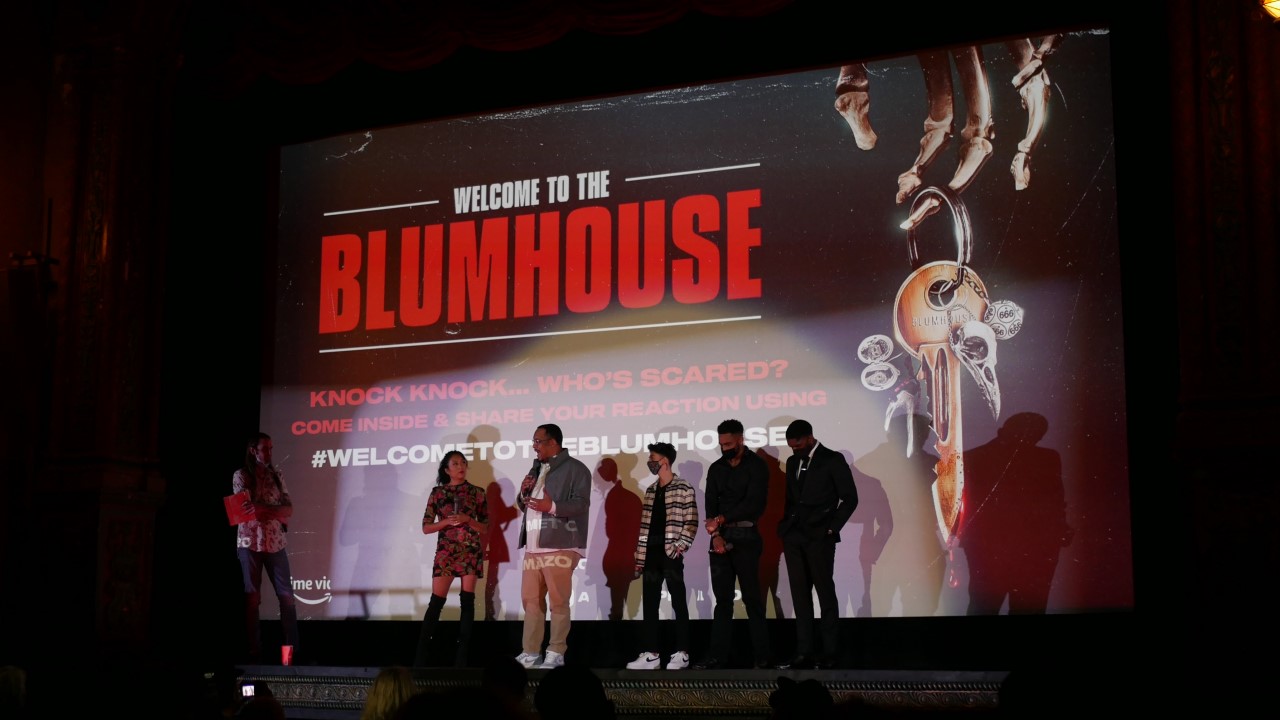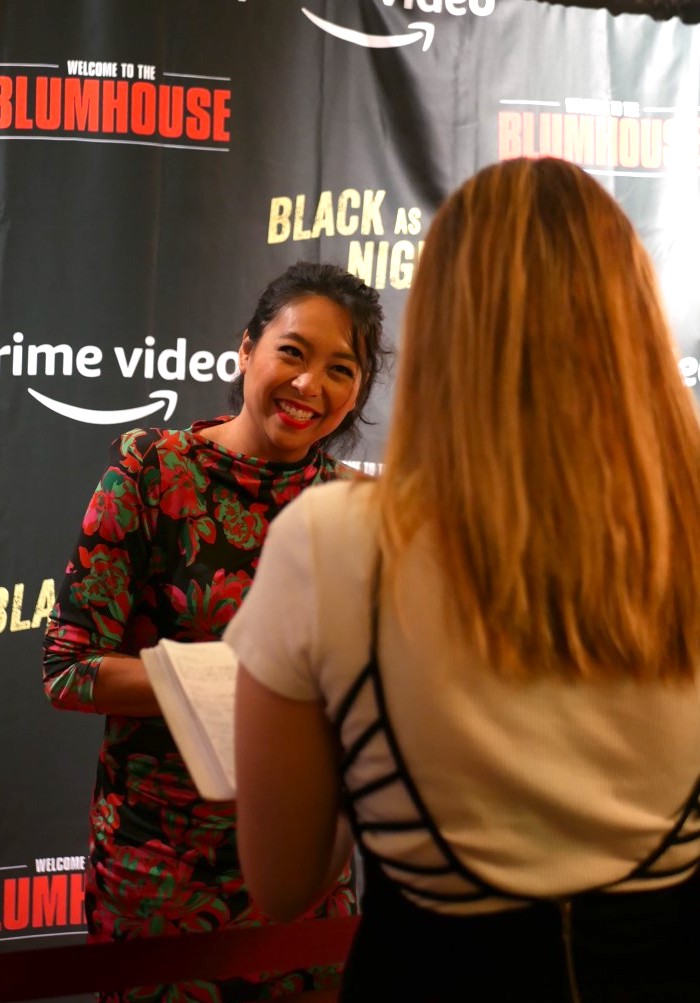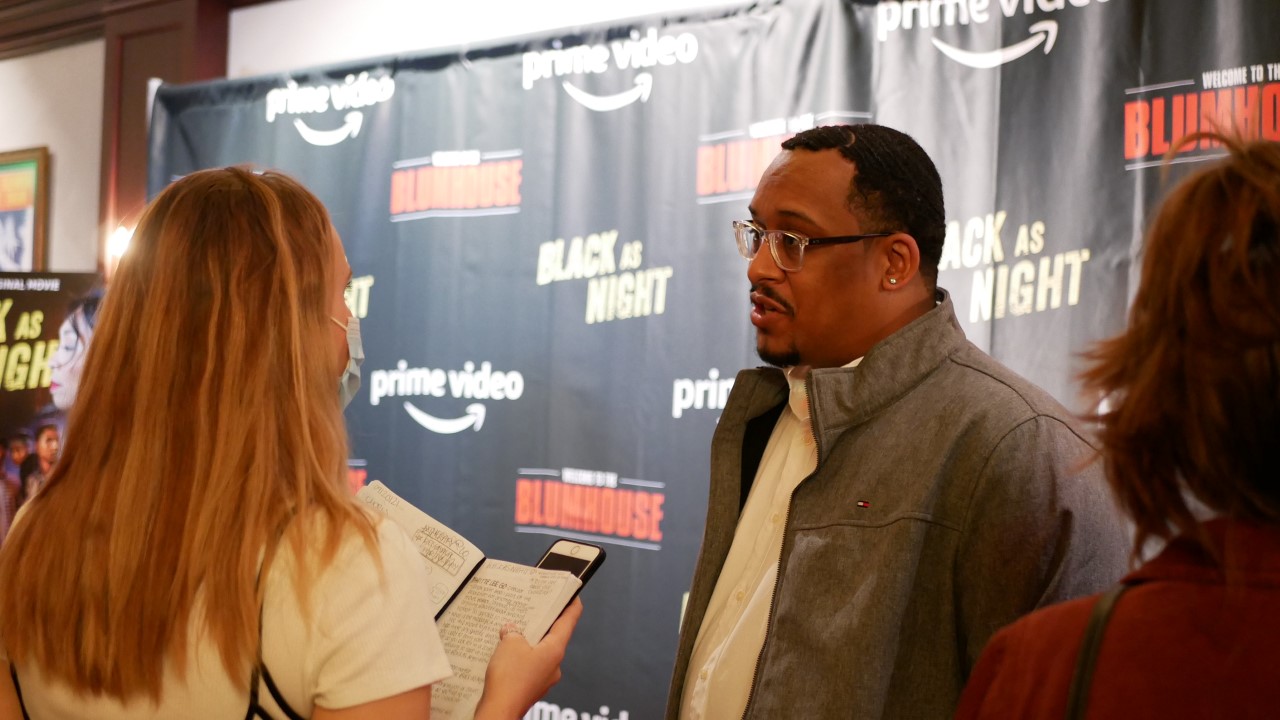
On Tuesday night, September 21st, 20201, moviegoers and horror fanatics alike flocked to the Music Box Theater in Lincoln Park to watch the premiere of “Black as Night.” As part of Blumhouse’s new film series for Prime Video, Welcome to the Blumhouse, “Black as Night” tells the story of a young girl who, along with her friends, must battle an army of bloodsuckers preying on the underprivileged before they take over all of New Orleans. But don’t be mistaken, this movie is not your typical vampire flick. “Black as Night” brings a comedic, coming-of-age spin to the genre of horror, all while commenting on colorism, systemic inequality, and the lasting effects Hurricane Katrina has on the people of New Orleans.

Before the screening, Sarah’s Backstage Pass had the opportunity to talk with a handful of the talented people who made “Black as Night” possible on the red carpet, including director Mariette Lee Go, screenwriter Sherman Payne, and actors Fabrizio Guido, Craig Tate, and Mason Beauchamp.
Here’s what some of them had to say:
Mariette Lee Go: Director
Sarah’s Backstage Pass: I know you’ve been part of the production for another horror movie before (Phobias, 2021), is there anything different about directing horror as opposed to other genres?
Mariette Lee Go: Definitely! Huge difference. My first movie, which has not come out yet, called “Rise,” is based on historical events and things happening now; it was kind of like a real-life horror. And then Phobias is a horror anthology that we did with “Radio Silence,” which is based on their outline of how they do shorts and develop it into a feature. So that was all based on individual stories that we had to figure out a way to put together. And then this one is just your straight, traditional feature horror based on a very classic monster, the vampire. And then my next movie is a musical!
SBP: Oh wow! So much of a difference!
MLG: Right! I love being able to jump genres. I think that my love for horror started at a very, very young age, so it feels like a dream come true to be able to do exactly what I’ve dreamt of as a kid. I’m kind of pinching myself, like, “Oh, is this real life? Oh, okay, cool, this is everything I’ve dreamt of. It’s coming?” And that’s insane.
SBP: And now you’re on the red carpet for your first directed horror movie! That’s amazing!
MLG: I know! I’m like, “what am I doing here” (laughing).
SBP: That’s insane! What’s one horror movie can you remember as a kid that sparked your love for [horror]?
MLG: Oh boy. “The Exorcist.” So, I grew up in a catholic, conservative home. My mom and dad are from the Philippines, and they taught me that demons are real. So, I had this very deep-seated fear of like, “demons are outside your door; they’re everywhere! When I saw “The Exorcist,” I went insane. I could not sleep for so long. My parents – my dad – showed me when I was way too young. So supernatural horrors that have to do with demons, monsters, stuff like that; they keep me up all night, and I love it. If I lose sleep on a horror film, I’m like, “yes; you’ve won, you’ve done well.” But yeah, I just love it. It feels fantastical, and I get to explore and push the envelope when shooting stuff; I love it.
SBP: If there was any specific message you wanted to bring across with your movie, what would you say it’d be?
MLG: There are so many messages within it. As in the lead character, Shawna, it’s a coming-of-age film, and we’re exploring the world through her eyes. One of the most important themes we explored was colorism. She’s a dark-skinned black woman, and she’s coming into her own. She’s very insecure about the way that she looks, the way that she is. She doesn’t think that guys like her; she doesn’t have a voice yet. Throughout the film, she discovers her voice and discovers that the strength is within herself. She comes to love her skin and love herself.
I think what’s really important is to find your inner strength. And when you really come to love yourself, others will fall in line. So, it starts with that.
SBP: Is there any specific directing techniques you used to bring your ideas to life?
MLG: I took a lot of inspiration from everywhere. “30 Days of Night” was a huge inspiration for me. This is a little bit lighter, you know because it’s a coming of age and there’s a lot of jokes in it, but I really took a lot of “30 Days of Night” with the silhouettes and seeing the vampires in the distance, the way that they do the fight scenes. I wanted to go even darker, but I couldn’t. For the audience, and this movie, in particular, it’s just a little bit safer.
We do a portion where we do an animation in it, so I take a lot of inspiration from “Kill Bill,” and I looked at a lot of anime, cartoons, and comic books because I love that animated style. I wanted to explore the history of these sets of vampires.
“Fight Club” was a big inspiration for it, too when he’s doing the hypnotizing, I really imagine the portion of “Fight Club” when he’s like “you’re not your khakis,” and stuff like that. So yeah, there was a lot of inspiration in it, pulling from different types of movies to put this together.

Craig Tate: Actor, “Le Faux”
Sarah’s Backstage Pass: Hi Craig, can you tell me a little bit about your character?
Craig Tate: Le Faux is a vampire who’s been around for a very long time, a couple of centuries. He has a way about him where he sees what he wants and goes for what he wants, as cliche as that sounds. He’s exotic; he’s a manipulator; he’s a master of oratory and physical manipulation.
SBP: So, he sounds terrifying.
CT: Yeah (laughing)!
SBP: But if there’s anything you could connect yourself with him to, what would it be?
CT: I’m often told that I have an old soul, and obviously, I’m playing someone that’s been alive for a few hundred years, so I can connect on that. Playing a mythical creature, depending on whatever you believe in – vampires or werewolves – it allows you the space to dive into the child-like imagination.
SBP: What did you have to do in order to prepare for your role? Did you have to research vampires?
CT: As a fan of film, I watch movies 24/7, all day, every week. So, obviously, with COVID-19 and the progression of it, the procession of it, going from March to May to August, I guess reading was just my preparation for it. Just reading as much as I can, taking in as much about the mind as I could, reading the different words of the people who’ve been around longer than I have, much like Le Faux. Maybe he read one to two thousand books,right? So, what to do to get inside the mind of a man that’s been around for a long time is you live like a man that’s been around for a long time.

Sherman Payne: Screenwriter
SBP: When writing a screenplay or a script, what kind of stories do you like to tell?
Sherman Payne: I like to tell stories about characters. I like to start character-first. I don’t really consider the action or genre before considering what I’m trying to say about the central individual driving the narrative. So, I want to get really in-depth with the character, what makes them tick, what drives them, and how they’re going to carry us through the whole story. So, people-driven stories is probably the best answer.
SBP: Yeah, that’s so interesting! I’ve never heard of that kind of process. Most of the time, people think of the story concept first, and then they narrow it down to the characters, but I think that’s important!
SP: Yeah, a lot of people are obsessed with genres and stuff. A lot of people want to really focus themselves on one way of doing stories, but I think the story working from a character point-of-view is the most important thing, and everything else is icing on the cake.
SP: Exactly! Movies are about people, so it should be important that that’s centralized. Yeah! And I love to write about black people. I’m a fan of all cinema from all different cultures, whether it’s white Americans, or Asian people, or Latino people, but I love to put black people on screen. That’s really a big goal of mine.
SBP: I think that’s really important too. Over the years, we haven’t seen a lot of diversity on camera, and we don’t see many deep, dynamic characters. And a lot of them play on different stereotypes, and it’s extremely harmful to people who are watching and the people making it. So, what did you do to create those characters that have that depth?
SP: Well, it’s all about making sure the characters are fully formed people who are trying to achieve something that we can relate to. I think as long as you do that, as long as they’re not surfaced and shallow and you’re really looking at what makes them tick and giving them something that’s going to drive the story. Sometimes you fall into something that’s stereotypical; look at the actor who played Omar from The Wired that died recently. Omar was a guy who held a shotgun and robbed drug dealers, but he never felt stereotypical because he was written so well, and he had so much depth behind the scenes. So, I’m really about finding that depth for each character and making sure they feel like three-dimensional people before we’re putting them on the screen.
SBP: What do you hope the audience is going to take away from your movie?
SP: Well, the first thing that all people should take away from any movie is that they have fun, that they’re entertained, and they watch a story that they find exciting, surprising. Hopefully, they get some laughs and some thrills along the way. That’s the number one thing. Any other writer who says otherwise doesn’t know what they’re talking about. You have to entertain the audience; you have to tell a great story.
But beyond that, I think there’s some great social messaging in this movie, and I hope that people start to think about how we treat people in our society, the people who are really vulnerable. I hope that people consider that. I hope people consider the specific things that happened in New Orleans, throughout history, but also in the last 20 years or so with some of the problems they’ve had and the mismanagement from the government… I hope people consider all that stuff.
“Black as Night” will be available for streaming on Prime Video starting October 1st as a part of Blumhouse’s Welcome to the Blumhouse movie installation.
PHOTO CREDIT: Shalyn Delhaes
Posted by Sarah Knight Adamson© September 24, 2021
